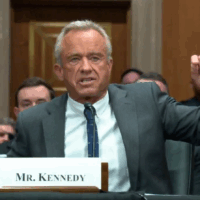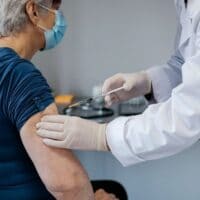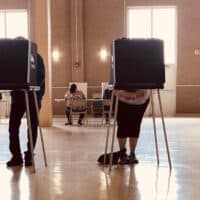Gov. Andy Beshear and Health Secretary Eric Friedlander announced a plan Friday to test every nursing home resident and employee in the state for free.
“We are now going to be very targeted in making sure that we know the situation in each of these facilities, especially for the most vulnerable, and are able to take some quick action,” Beshear said at his daily briefing. Around 58 percent of the state’s COVID-19 deaths have been nursing home residents.
- RELATED: Nursing home inspections became shorter when pandemic hit, and found almost no infection-control issues
Friedlander said, “With the ability to now test every resident of our long-term care facilities, we can take an even more aggressive approach to our battle against the coronavirus.” He said the state, Norton HealthCare and local health departments and emergency management leaders would be testing every resident and every staff member at all 286 skilled nursing homes in Kentucky.
He stressed that to get tests, a facility must have a plan for how to manage whatever the tests reveal. Asked how a facility would remain staffed if it finds many of its employees are infected, he said the state would help.
Friedlander noted the state has sent medical and nursing students to help, is using the National Guard and one facility in Northern Kentucky, and has received staff help from hospitals. He said Nortonhas sent nurses and certified nursing assistants “to hold facilities together,” and the state’s nursing home task force is working on way to match up recent graduates and facilities that need staff.
He said the state has provided additional reimbursements, support and guidance to the facilities, but worried a month ago about falling short of test kits and personal protective equipment, “and frankly, we had a long way to go.”
At this point, the state has tested about 10 percent of all residents, and testing all of them would take a couple of months to get all of the testing done, Friedlander said.
He said the state is prioritizing facilities with eight factors, including their current rate of infection and if they are in a county with high rates of positive tests. He said they have tested about a third of the homes that have been placed in the highest category.
The state would also test in assisted-living facilities “when they start to have trouble,” Friedlander said, and that would bring them to the top of the list.
Friedlander said one of the best things Kentucky did was be one of the first states to stop visitation at the nursing homes, but he acknowledged that this has been hard of residents and families, and that Mother’s Day is approaching. He encouraged facilities to find creative ways to allow visitation, through closed windows, Plexiglas visitation stations or technological assistance, which the state has provided in some cases.
“We know that you miss meeting with your loved ones,” he said. “That is a very big sacrifice that you have made, but it is an important sacrifice and as the governor says, you have saved lives.”
Beshear said nine more residents and three more employees have tested positive in Kentucky long-term care facilities, bringing the respective totals to 862 residents and 356 staff. In 81 facilities, 174 residents and two staffers have died. Click here for more information.
Reopenings
Beshear said the state had posted the minimum requirements for all businesses and organizations that will open through May 20.
Guidance has been added for government offices and agencies, which can open May 18; funeral homes, which can open May 20; and places of worship and retail under “Healthy At Work” at kycovid19.ky.gov.
Beshear praised the efforts of the faith community in drafting these guidelines, specifically pointing to the Kentucky Baptist Convention and the Kentucky Council of Churches.
The requirements say that houses of worship will need to limit attendance to one-third of occupancy, including clergy; maintain six feet of physical distance between attendees, even in rows; not provide communal food or beverages; avoid handshaking and hugs; wear masks or face coverings; increase sanitization; avoid live choir or singing; consider taking temperatures or asking about symptoms, and not admit those who have them; use greeters and markers to guide social distancing; and allow only one person in a restroom at a time, with adequate hand sanitizer and soap. It adds that youth services should not resume until June 15, the same date child-care facilities are tentatively set to reopen.
Beshear said, “Remember, listen to your faith leader. If they tell you that they’re not ready and that they don’t think that it’s safe, then you should wait.” He added that this should be the case for all businesses.
Testing
Beshear stressed the importance of testing and contact tracing as the state reopens its economy, and said Kentucky now has the capacity to do about 50,000 tests a week, which would more than meet the federal guidelines for reopening.
He said the next step is to make sure people use that testing capacity, even if they don’t have symptoms, since many with the virus are asymptomatic but can still infect others.
“Making sure people get tested is our new challenge,” Beshear said, adding that is preferable to the challenges of the last two months.
We don’t have to make excuses anymore,” he said. “We’re not facing the same type of shortages. So let’s make sure as we go back to being healthy at work that we’re doing everything we can to take care of those around us.”
Again, Beshear pleaded with Kentuckians to wear masks, especially as many places reopen Monday.
Holding up his mask, he said, “Knowing that the decision to wear one of these may be the difference if you are asymptomatic between someone else living and someone else dying. … It is just one small thing I can do to live out my faith, that Golden Rule: How I can be a good neighbor, how I can be ethical in this time of the coronavirus?”
At the start of his briefing, Beshear made a different sort of argument: “The healthiest economy coming out of 2019 is the one that’s able to keep the virus contained as they successfully reopen. That is what our plan is designed to do.”
Melissa Patrick is a reporter for Kentucky Health News, an independent news service of the Institute for Rural Journalism and Community Issues, based in the School of Journalism and Media at the University of Kentucky, with support from the Foundation for a Healthy Kentucky. She has received several competitive fellowships, including the 2016-17 Nursing and Health Care Workforce Media Fellow of the Center for Health, Media & Policy, which allowed her to focus on and write about nursing workforce issues in Kentucky; and the year-long Association of Health Care Journalists 2017-18 Regional Health Journalism Program fellowship. She is a former registered nurse and holds degrees in journalism and community leadership and development from UK.






